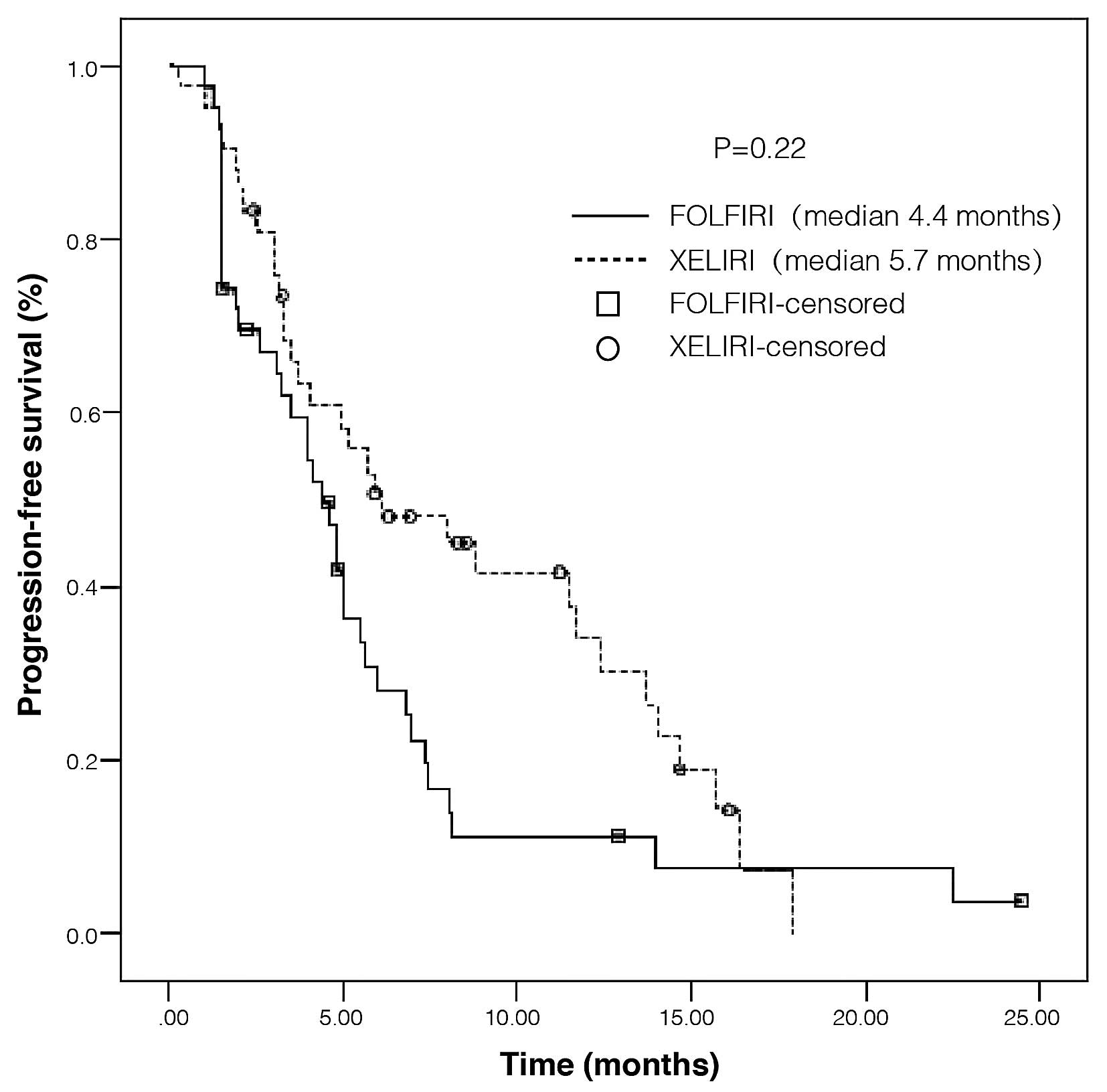|
1
|
Jemal A, Bray F, Center MM, Ferlay J, Ward
E and Forman D: Global Cancer Statistics. CA Cancer J Clin.
61:69–90. 2011.
|
|
2
|
Chen Q, Liu ZC, Cheng LP, et al: An
analysis of incidence and mortality of colorectal cancer in China,
2003–2007. China Cancer. 21:179–182. 2012.(In Chinese).
|
|
3
|
Meropol NJ: Oral fluoropyrimidines in the
treatment of colorectal cancer. Eur J Cancer. 34:1509–1513.
1998.
|
|
4
|
Mayer RJ: Oral versus intravenous
fluoropyrimidines for advanced colorectal cancer: by either route,
it’s all the same. J Clin Oncol. 19:4093–4096. 2001.
|
|
5
|
Massuti B, Gómez A, Sastre J, et al:
Randomized phase III trial of the TTD Group comparing capecitabine
and oxaliplatin (XELOX) vs. oxaliplatin and 5-fluorouracil in
continuous infusion (FUFOX) as first line treatment in advanced or
metastatic colorectal cancer (CRC). J Clin Oncol. 24(Suppl 18):
S1652006.
|
|
6
|
Díaz-Rubio E, Tabernero J, Gómez-España A,
et al; Spanish Cooperative Group for the Treatment of Digestive
Tumors Trial. Phase III study of capecitabine plus oxaliplatin
compared with continuous-infusion fluorouracil plus oxaliplatin as
first-line therapy in metastatic colorectal cancer: final report of
the Spanish Cooperative Group for the Treatment of Digestive Tumors
Trial. J Clin Oncol. 25:4224–4230. 2007.
|
|
7
|
Tol J, Koopman M, Rodenburg CJ, et al: A
randomised phase III study on capecitabine, oxaliplatin and
bevacizumab with or without cetuximab in first-line advanced
colorectal cancer, the CAIRO2 study of the Dutch Colorectal Cancer
Group (DCCG). An interim analysis of toxicity. Ann Oncol.
19:734–738. 2008.
|
|
8
|
Cunningham D, Pyrhönen S, James RD, et al:
Randomised trial of irinotecan plus supportive care versus
supportive care alone after fluorouracil failure for patients with
metastatic colorectal cancer. Lancet. 352:1413–1418. 1998.
|
|
9
|
Rougier P, Van Cutsem E, Bajetta E, et al:
Randomised trial of irinotecan versus fluorouracil by continuous
infusion after fluorouracil failure in patients with metastatic
colorectal cancer. Lancet. 352:1407–1412. 1998.
|
|
10
|
Fuchs CS, Moore MR, Harker G, et al: Phase
III comparison of two irinotecan dosing regimens in second-line
therapy of metastatic colorectal cancer. J Clin Oncol. 21:807–814.
2003.
|
|
11
|
Munoz A, Salud A, Giron CG, et al:
Randomised phase III trial comparing irinotecan plus capecitabine
(XELIRI regimen) vs. irinotecan, 5-Fu and folinic acid (Saltz
regimen) as first-line treatment in patients (pts) with metastatic
colorectal cancer (MCRC). Ann Oncol. 17(Suppl 9): S1202006.
|
|
12
|
Koopman M, Antonini NF, Douma J, et al:
3015 ORAL Sequential vs. combination chemotherapy with
capecitabine, irinotecan, and oxaliplatin in advanced colorectal
cancer (ACC). A Dutch Colorectal Cancer Group (DCCG) phase III
study. Eur J Cancer. (Suppl 5): S239–S240. 2007.
|
|
13
|
Pectasides D, Papaxoinis G, Kalogeras KT,
et al: XELIRI-bevacizumab versus FOLFIRI-bevacizumab as first-line
treatment in patients with metastatic colorectal cancer: a Hellenic
Cooperative Oncology Group phase III trial with collateral
biomarker analysis. BMC Cancer. 12:2712012.
|
|
14
|
Skof E, Rebersek M, Hlebanja Z and Ocvirk
J: Capecitabine plus Irinotecan (XELIRI regimen) compared to
5-FU/LV plus Irinotecan (FOLFIRI regimen) as neoadjuvant treatment
for patients with unresectable liver-only metastases of metastatic
colorectal cancer: a randomised prospective phase II trial. BMC
Cancer. 9:1202009.
|
|
15
|
Lévesque E, Bélanger AS, Harvey M, et al:
Refining the UGT1A haplotype associated with irinotecan-induced
hematological toxicity in metastatic colorectal cancer patients
treated with 5-fluorouracil/irinotecan-based regimens. J Pharmacol
Exp Ther. 345:95–101. 2013.
|
|
16
|
Ratain MJ: From bedside to bench to
bedside to clinical practice: an odyssey with irinotecan. Clin
Cancer Res. 12:1658–1660. 2006.
|
|
17
|
Han JY, Lim HS, Shin ES, et al:
Comprehensive analysis of UGT1A polymorphisms predictive for
pharmacokinetics and treatment outcome in patients with
non-small-cell lung cancer treated with irinotecan and cisplatin. J
Clin Oncol. 24:2237–2244. 2006.
|
|
18
|
Takano M, Kato M, Yoshikawa T, et al:
Clinical significance of UDP-glucuronosyltransferase 1A1*6 for
toxicities of combination chemotherapy with irinotecan and
cisplatin in gynecologic cancers: a prospective multi-institutional
study. Oncology. 76:315–321. 2009.
|
|
19
|
Carlini LE, Meropol NJ, Bever J, et al:
UGT1A7 and UGT1A9 polymorphisms predict response and toxicity in
colorectal cancer patients treated with capecitabine/irinotecan.
Clin Cancer Res. 11:1226–1236. 2005.
|
|
20
|
Eisenhauer EA, Therasse P, Bogaerts J, et
al: New response evaluation criteria in solid tumours: revised
RECIST guideline (version 1.1). Eur J Cancer. 45:228–247. 2009.
|
|
21
|
Ajani JA, Welch SR, Raber MN, Fields WS
and Krakoff IH: Comprehensive criteria for assessing
therapy-induced toxicity. Cancer Invest. 8:147–159. 1990.
|
|
22
|
Borner MM, Bernhard J, Dietrich D, et al;
Swiss Group for Clinical Cancer Research (SAKK), Berne,
Switzerland. A randomized phase II trial of capecitabine and two
different schedules of irinotecan in first-line treatment of
metastatic colorectal cancer: efficacy, quality-of-life and
toxicity. Ann Oncol. 16:282–288. 2005.
|
|
23
|
Rea DW, Nortier JW, Ten Bokkel Huinink WW,
et al: A phase I/II and pharmacokinetic study of irinotecan in
combination with capecitabine as first-line therapy for advanced
colorectal cancer. Ann Oncol. 16:1123–1132. 2005.
|
|
24
|
Mathijssen RH and Gurney H: Irinogenetics:
how many stars are there in the sky? J Clin Oncol. 27:2578–2579.
2009.
|
|
25
|
Innocenti F, Undevia SD, Iyer L, et al:
Genetic variants in the UDP-glucuronosyltransferase 1A1 gene
predict the risk of severe neutropenia of irinotecan. J Clin Oncol.
22:1382–1388. 2004.
|
|
26
|
Cecchin E, Innocenti F, D’Andrea M, et al:
Predictive role of the UGT1A1, UGT1A7, and UGT1A9 genetic variants
and their haplotypes on the outcome of metastatic colorectal cancer
patients treated with fluorouracil, leucovorin, and irinotecan. J
Clin Oncol. 27:2457–2465. 2009.
|















